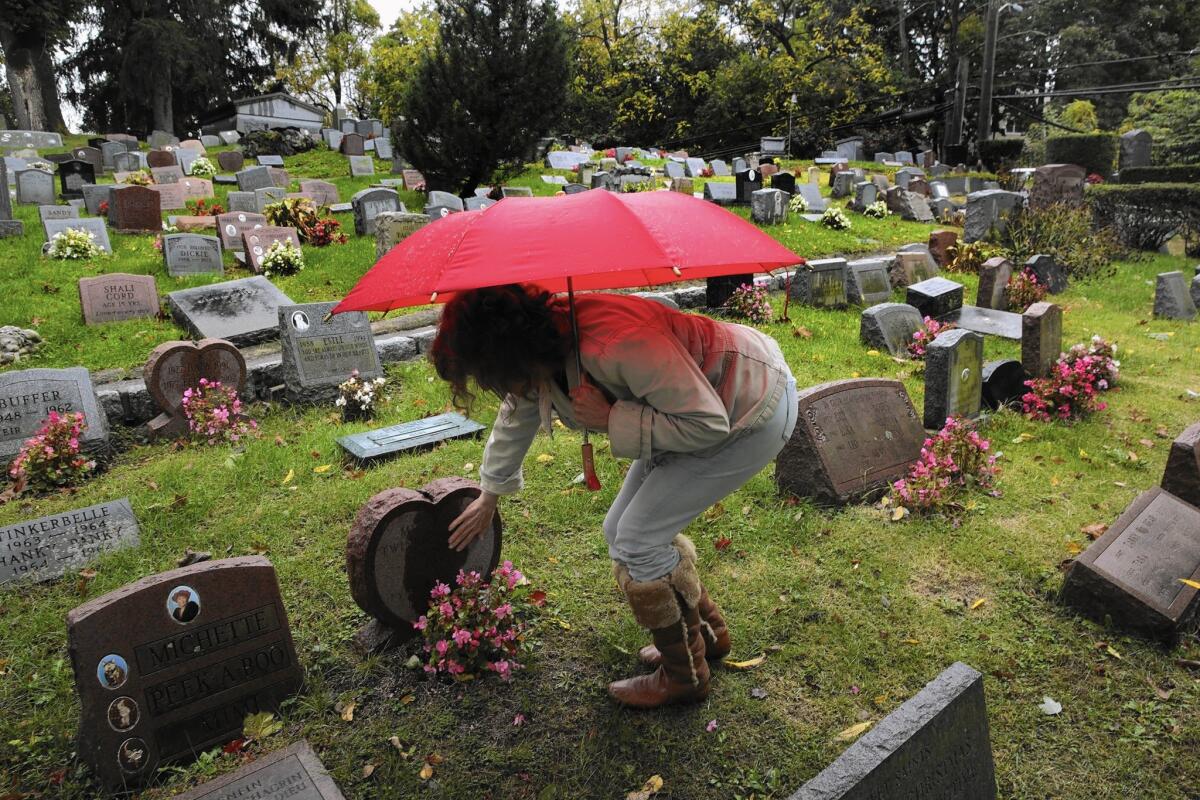Pet cemetery lets best friends stay together after death

reporting from HARTSDALE, N.Y. — Rhona Levy gazed into the small oak casket and stroked the soft hair lying on the white satin pillow.
“I will always be with you,” she said, leaning down to kiss the tiny forehead.
Then Levy removed a pendant from her neck and clasped it around the throat of her loved one: Twinkie.
The 16-year-old tuxedo cat now lies beneath a heart-shaped pink granite headstone at Hartsdale Pet Cemetery, the world’s largest burial ground for pets. Dogs, cats, guinea pigs, goldfish, horses, rabbits, turtles, a lion cub, lizards and more are buried at Hartsdale, which covers five bucolic acres on a former apple orchard in this suburb north of New York City.
Human remains rest here too. Someday, Levy’s will join them, with half her ashes in the plot with Twinkie and half in a plot holding her three other late pets: cats Pumpkin and Putchke, and a dog named Snow.
“Who do you want to be with when you’re dead?” said Levy, 65, a vivacious administrative assistant at a real estate firm who visits her pets’ graves weekly. “You want to be with your family.”
The International Center of Pet Cemeteries and Crematories in Atlanta lists more than 200 pet crematoriums and burial grounds across the U.S. Hartsdale, established in 1896, is on the National Register of Historic Places. The Lonely Planet travel guidebook has listed it as one of the world’s top 10 burial grounds.
Hartsdale was in the news this year when the state formally changed its law to permit cremated human remains to be buried with pets. That ended a long-running battle between the state and the family of a New York City policeman, Thomas Ryan, who died in 2011 and wanted his ashes buried with his dogs in Hartsdale.
“The right to be buried with your family, whether it’s four-legged or two-legged, seems so fundamental, yet it’s still something that upsets a lot of people,” said Edward C. Martin Jr., the cemetery director since 1974.
Martin cannot understand the objections. His large family plot holds “more than five and less than 10” animals, including dogs and his grandchildren’s goldfish. The ashes of his parents and his wife’s parents are also there.
From the moment you walk through the iron gate, pass beneath a canopy of shade trees and take in the thousands of graves planted with pink begonias, it becomes clear that Hartsdale is not your usual cemetery.
Just past the entrance to the right, a small stone slab marks the grave of one Anwar Sadat, who lived from 1985 to 1997. Fluffy (1983-96) rests above him.
A wide, paved path leads uphill to a towering monument to war dogs that died serving the country. A small granite marker at its foot pays tribute to Laika, the bright-eyed stray sent into space by the Soviets in 1957 and left to die in orbit.
Narrow trails meander across the slopes, past headstones etched with epitaphs humorous and heartfelt.
“Skippy. A good doggie.” “Chewies and bananas forever.” “Born a dog, lived like a gentleman, died beloved.”
Headstones etched with crosses sit beside those bearing the Star of David. Cats are buried close to dogs, rabbits and reptiles.
There is no separation of religions or species, no hierarchy that guarantees more desirable spots for the pets of the rich and famous. Hence the cemetery’s nickname: the Peaceable Kingdom.
The oldest headstone sits above Blague, a dog who died in 1898. The biggest grave is a 50-ton mausoleum for four spaniels. The most unusual? Perhaps the stone lion marking the grave of Goldfleck, a lion cub kept as a pet in New York City who died in 1912.
Mariah Carey, John Barrymore and George Raft are among the celebrities, living and dead, who have pets buried here.
There are countless Cuddles, Snoopys, Tigers and Whiskers. There is a Spaghetti, a Whiskey, a Brandy and a Peanut. There are pets named for famous humans, including Shakespeare, Aristotle, Cleopatra and Led Zeppelin. There are pets named for non-famous humans: Cindy, Kim, Tina and Padilla.
Martin says there are about 100,000 animals buried at Hartsdale, but it is impossible to know for certain because many plots contain more than one pet.
Depending on the size and the type of casket, a service can cost several thousand dollars. Plot holders pay $63 a month, or a one-time fee of $2,100, to cover maintenance costs.
Services include visitation rites and placing flowers on freshly dug graves. “This isn’t just about digging a hole and putting a pet in,” Martin said.
Martin’s sons, Edward and Brian, take calls from anguished humans whose pets have passed away. On a recent gray day, they were preparing a service for a white rabbit named Sammy, who lay on his side in a white casket. A blanket covered all but Sammy’s face.
Sammy’s owner remained in the visitation room for nearly an hour, quietly weeping, while a gravedigger prepared the grave in rain-soaked ground.
Many plot holders request wakes for their pets to say final goodbyes.
Retired U.S. Army Col. James Reid, 75, held one for his Rhodesian ridgeback, Trajan, who was born in 2000 and died in 2013. Reid, his wife, Riet, and a family friend came to Hartsdale that somber day. Trajan, who weighed about 70 pounds, was laid out in an open casket in the visitation room.
------------
FOR THE RECORD
Dec. 1, 11 a.m.: A previous version of this article gave retired Army Col. James Reid’s age as 85. He is 75.
------------
“I would not go through that again. It brings back all the memories,” said Reid, who visits Trajan’s grave weekly. The dog accompanied him everywhere, even to his doctor’s appointments.
When Trajan died at home in nearby Scarsdale, his brown eyes were open. Reid insisted they remain that way for his burial.
“Tender, beautiful, sensitive eyes,” reads the epitaph on the large, black headstone atop the plot holding Trajan and two more of the Reids’ dogs, Tiffany and Toby.
“It isn’t fair that dogs live such short periods of time,” Reid said.
The Reids cremated Tiffany and Toby but could not bring themselves to do the same with Trajan.
Levy did not cremate any of her pets, but has no qualms about being cremated herself so she can be interred with them.
For each pet, Levy held a private wake, requesting to be alone in the visitation room.
“I hold the pet. I touch them. I kiss them. I tell them I will always be with you,” she said.
She left a personal item — a bit of clothing or a trinket — in each pet’s casket. With Twinkie, it was her Star of David necklace, “so she would have a part of me always,” Levy said. “Something that I wore.”
Levy watched Twinkie being lowered into the ground. She shoveled the first mound of dirt onto the casket, then walked away.
Twitter: @tinasusman
More to Read
Sign up for Essential California
The most important California stories and recommendations in your inbox every morning.
You may occasionally receive promotional content from the Los Angeles Times.











